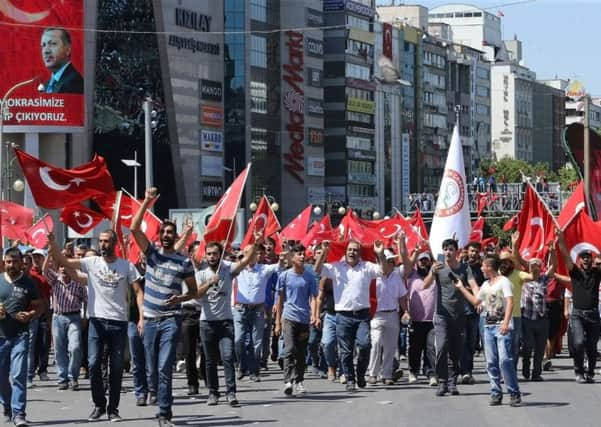Turkish uprising heightens security fears in turbulent times


President Racep Tayip Erdogan’s determination to stay in power has seen him adopt an increasingly authoritarian style of rule. He has shaken up the government, cracked down on dissidents, restricted the news media and renewed fighting with Kurdish rebels.
The government has also come under pressure from the millions of refugees in Turkey who have fled violence in neighbouring Syria and Iraq, and a series of bloody attacks in Turkey blamed on the Islamic State group and Kurdish rebels.
Advertisement
Hide AdAdvertisement
Hide AdThe uprising appears not to have been backed by the most senior ranks of the military, and Turkey’s main opposition parties quickly condemned the attempted overthrow of the government. Acting chief of general staff General Umit Dundar said the plotters were mainly officers from the air force, the military police and the armoured units.
Yesterday’s bloodshed has implications for Western efforts to defeat Islamic State. Turkey has allowed American jets to use its Incirlik air base to fly missions against the extremists in nearby Syria and Iraq. The coup attempt against the democratically elected government could make it difficult for the United States to continue to co-operate with Turkey.
Erdogan’s Islamist government has also been accused of playing an ambiguous – even double-sided – role in Syria. Turkey’s renewed offensive against Kurdish militants – who seek more autonomy and are implacable foes of IS – has complicated the fight against the Islamic State group.
US President Barack Obama urged all sides in Turkey to support the democratically elected government. Nato secretary-general Jens Stoltenberg said he spoke to the Turkish foreign minister, Mevlut Cavusoglu, and called for respect for democracy. The coup attempt could also have ramifications for Turkey’s hopes of joining the European Union. Yesterday European Council president Donald Tusk said the EU supports Turkey’s democratically elected government in the wake of the attempt, which left scores dead and wounded.
Speaking in Mongolia at the Asia-Europe summit meeting,
Tusk also called for a swift return to Turkey’s constitutional order.
The leaders of Greece’s armed forces and police held emergency meetings in Athens to monitor developments in neighbouring Turkey, according to government officials.
The two countries have ongoing airspace and sea boundary disputes in the Aegean Sea. They also collaborate in implementing an agreement with the European Union – monitored by Nato – to limit the number of refugees and migrants travelling to Europe.